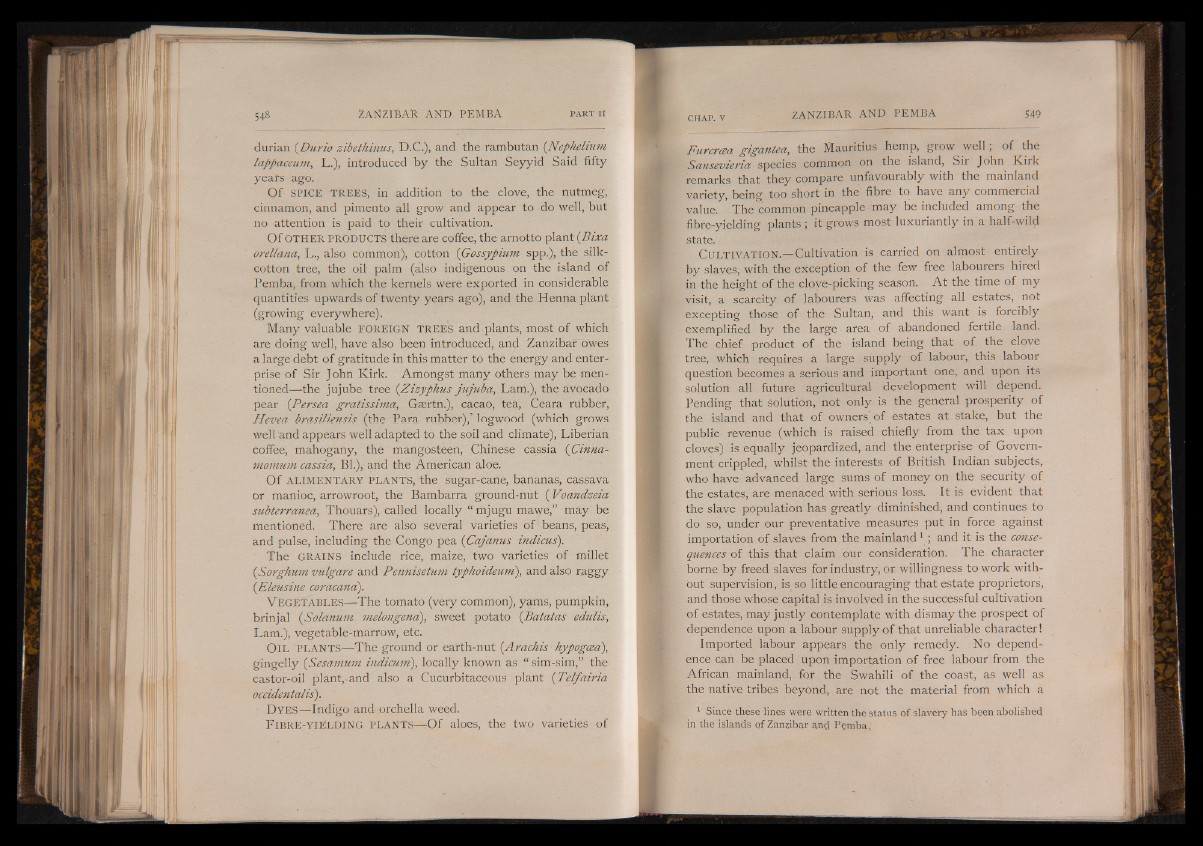
durian (Durio zibethinus, D.C.), and the rambutan (Nepheliam
lappacemn, L.), introduced by the Sultan Seyyid Said fifty
yeafs ago.
Of s p ic e t r e e s , in addition to the clove, the nutmeg,
cinnamon, and pimento all grow and appear to do well, but
no attention is paid to their cultivation.
Of OTHER PRODUCTS there are coffee, the arnotto plant (Bixa
orellana, L., also common), cotton (Gossypium spp.), the silk-
cotton tree, the oil palm (also indigenous on the island of
Pemba, from which the kernels were exported in considerable
quantities upwards of twenty years ago), and the Henna plant
(growing everywhere).
Many valuable FOREIGN TREES and plants, most of which
are doing well, have also been introduced, and Zanzibar owes
a large debt of gratitude in this matter to the energy and enterprise
of Sir J ohn Kirk. Amongst many others may be mentioned—
the jujube tree [Zizyphus jujuba, Lam.), the avocado
pear (Persea gratissima, Gaertn.), cacao, tea, Ceara rubber,
Hevea brasiliensis (the Para rubber)," logwood (which grows
well and appears well adapted to the soil and climate), Liberian
coffee, mahogany, the mangosteen, Chinese cassia (Cinna-
mornum cassia, Bl.), and the American aloe.
O f A LIMEN TARY PLANTS, the sugar-cane, bananas, cassava
or manioc, arrowroot, the Bambarra ground-nut ( Voandzeia
subterránea, Thouars), called locally “ mjugu mawe,” may be
mentioned. There are also several varieties o f 1 beans, peas,
and pulse, including the Congo pea (Cajanus indicus).
The GRAINS include rice, maize, two varieties of millet
(Sorghum vulgare and Pennisetum typhoideum), and also raggy
(Eleusine coracana).
V EG E T A B L E S— The tomato (very common), yams, pumpkin,
brinjal (Solanum melongenci), sweet potato (Batatas edulis,
Lam.), vegetable-marrow, etc.
O i l p l a n t s— The ground or earth-nut {Arachis hypogma),
gingeily (Sesamum indicum), locally known as “ sim-sim,” the
castor-oil plant, and also a Cucurbitaceous plant (Telfairia
occidentalis).
DYES— Indigo and orchella weed.
F ib r e -YIÉLDING p l a n t s— Of aloes, the two varieties of
Furcrcea gigantea, the Mauritius hemp, grow well ; of the
Sansevieria species common on the island, Sir John Kirk
rcmarks that they compare unfavourably with the mainland
variety, being too short in the fibre to have any commercial
value. The common pineapple may be included among the
fibre-yielding plants ; it grows most luxuriantly in a half-wild
state.
C u l t iv a t io n .— Cultivation is carried on almost entirely
by slaves, with the exception of the few free labourers hired
in the height of the clove-picking season. A t the time of my
visit, a scarcity of labourers was affecting all estates, not
excepting those of the Sultan, and this want is forcibly
exemplified by the large area of abandoned fertile land.
The chief product of the island being that of the clove
tree, which requires a large supply of labour, this labour
question becomes a serious and important one, and upon its
solution all future agricultural development will depend.
Pending that solution, not only is the general prosperity of
the island and that of owners'of estates at stake, but the
public revenue (which is raised chiefly from the tax upon
cloves) is equally jeopardized, and the enterprise of Government
crippled, whilst the interests of British Indian subjects,
who have advanced large sums of money on the security of
the estates, are menaced with serious loss. It is evident that
the slave population has greatly diminished, and continues to
do so, under our preventative measures put in force against
importation of slaves from the mainland1 ; and it is the consequences
of this that claim our consideration. The character
borne by freed slaves for industry, or willingness to work without
supervision, is so little encouraging that estate proprietors,
and those whose capital is involved in the successful cultivation
of estates, may justly contemplate with dismay the prospect of
dependence upon a labour supply of that unreliable character!
Imported labour appears the only remedy. No dependence
can be placed upon importation of free labour from the
African mainland, for the Swahili of the coast, as well as
the native tribes beyond, are not the material from which a
1 Since these lines were written the status of slavery has been abolished
in the islands of Zanzibar and Pemba,